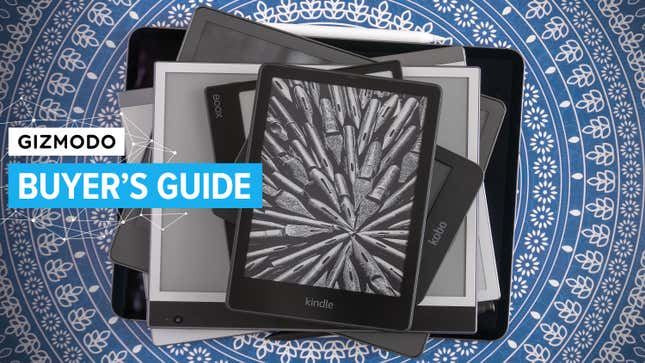
Tablets continue gaining ground in the market, even as laptop computers slim down enough to fit in paper envelopes. They’re useful as both highly portable productivity tools and as entertainment devices—whether you’re a gamer, binge watcher, or an avid reader. Sometimes, you just don’t need a whole keyboard attached to your portable computing device. But over 13 years after the original iPad debuted, it now seems like there are too many tablet devices to choose from.
There’s no need to splurge on the most expensive tablet available. That’ll snag you a capable device, but that strategy could also work against you, depending on your needs. If you all you want to do is read books, for example, a giant slab of glass with a battery that needs a charge every night just isn’t the way to go, both for your budget and usability. And if you’re worried about what all that screen time is doing to your eyes, it might finally be time to embrace an E Ink screen.
We’ve done all the hard decision-making work for you, so here are our recommendations for the best tablets, e-readers, and e-note devices you can buy.
Jump to:
- The Best Tablet For Most
- The Best Android Tablet
- The Best Tablet for Portability
- The Best Budget Tablet
- The Best E-Reader for Most Users
- The Best Budget E-Reader
- The Best E-Reader for Those Who Don’t Want to Decide
- The Best E-Note
The Buying Forecast
With most companies timing their product announcements and releases to ensure they’re in consumer’s minds, and on store shelves, in time for the holiday shopping season later in the year, we’re not expecting a lot of new hardware anytime soon. But back in 2022, Apple debuted its M1 iPad Air upgrade in March, so new hardware isn’t completely off the table.
There are also some exciting innovations on the horizon when it comes to screen technology other than LCDs and OLEDs. E-readers have long been limited to monochromatic screens due to the limitations of E Ink’s electronic paper technology, but while a handful of color E Ink devices have debuted over the past few years, the performance and quality of the displays has been lacking.
That’s about to change very soon, as e-reader and e-note makers will soon be debuting devices using two new screen technologies. E Ink’s new Kaleido 3 screens promise better color saturation, color depth, and improved resolutions for devices where speedy screen refreshes are critical, while the company’s Gallery 3 e-paper displays boost the color fidelity from just 4,096 shades to over 50,000, using a “four particle ink system: cyan, magenta, yellow and white.” Gallery 3 also pushes resolutions to 300 DPI, matching black and white E Ink displays, and is expected to debut on devices like Pocketbook’s Viva very soon.
The editorial staff of Gizmodo independently test and review each product found in our Buyer’s Guides. If you purchase something using our affiliate links, G/O Media may earn a commission. Affiliate linking does not influence our editorial content.
The Best Tablet For Most: Apple iPad (10th Generation)
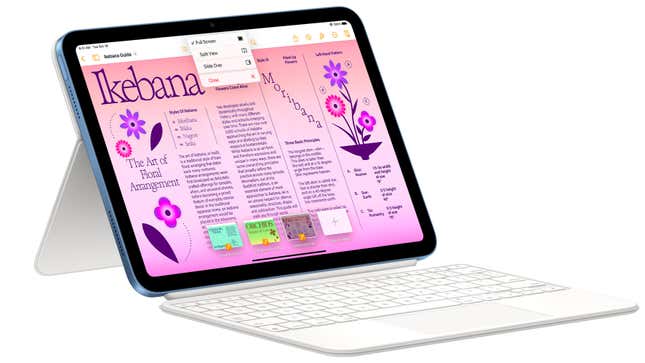
Artists relying on Photoshop or those using their tablet as a video editing tool should consider the iPad Pro or the iPad Air, which feature the same M1 and M2 processors used in Apple’s laptops and smartphones. But if you need a tablet for gaming, watching streaming content, reading books and magazines, and web surfing, the $449 10th generation iPad, which debuted just last month, is a solid choice. It has a lot of the same features as the pricier $599 5th generation iPad Air, including a 12.9-inch Liquid Retina display, a USB-C charging port, Touch ID biometric security, and support for the original Apple Pencil stylus, but moves the 12MP front-facing camera to the edge of the tablet so it’s easier to make FaceTime video calls in landscape mode. It’s also powered by the A14 Bionic chip that debuted in 2020, which should still provide enough power for most users, even those wanting to use the iPad as a basic productivity tool.
The Best Android Tablet: Samsung Galaxy Tab S8
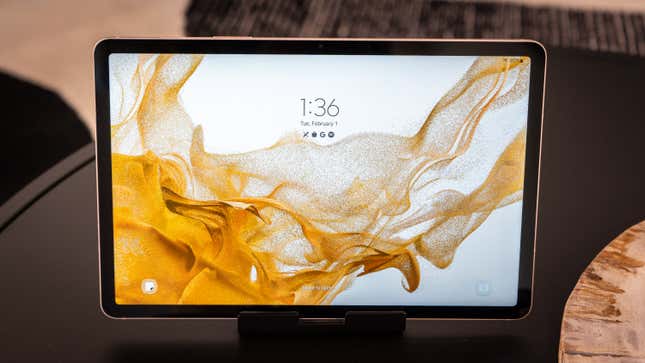
Apple and Amazon’s tablets are (out of the box, at least) walled garden devices that limit where users can get content and apps, and not everyone is a fan of that approach. It’s one of the many reasons that Android has thrived, and while excellent tablets running Google’s mobile OS are harder to find, there are still some solid options available, like the $699 Samsung Galaxy Tab S8. It’s actually the smallest and cheapest option of three Samsung tablets announced early last year, with an 11-inch display and a biometric fingerprint sensor on the side of its housing. It’s compatible with Samsung’s S Pen stylus for note-taking or more artistic endeavors, and the included 256GB of storage can be expanded with a microSD memory card—a feature you won’t find on any iPad.
The Best Tablet for Portability: Apple iPad mini (6th Generation)
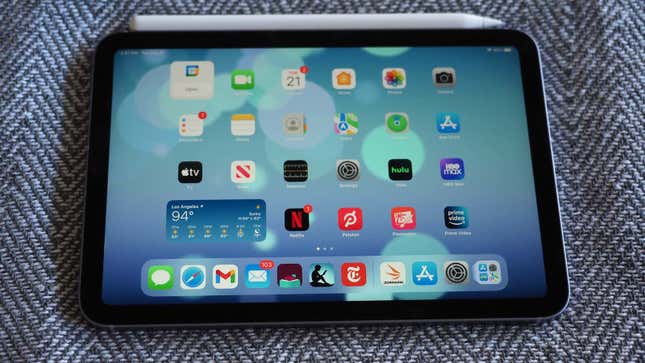
Despite being $50 pricier than the much larger 10th generation iPad, it’s impossible to find someone who’s not completely enamored with the $499 6th generation iPad mini the instant they pick it up. It’s everything great about the larger iPads in a much smaller and lighter package, with an 8.3-inch screen that’s still large enough to read full color comic books, graphic novels, and magazines. It actually features a slightly more powerful processor than the latest iPad—the A15 Bionic chip—and supports the new Apple Pencil 2 for note-taking or just doodling. The Apple Pencil 2 can also magnetically attach to the edge of the iPad mini and charge while connected.
The Best Budget Tablet: Amazon Fire HD 10
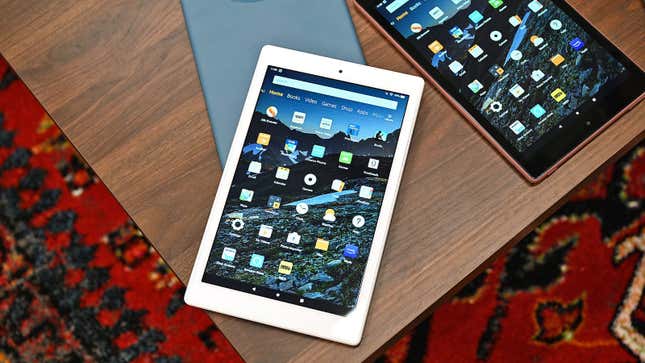
As gateways into Amazon’s music, ebook, and video streaming services, the company’s tablets are priced as loss-leader devices, and the Fire HD 10 tablet, with its 10.1-inch 1080P display, can be had for just $110. It is heavily tied into Amazon’s services, with a customized front-end, and while it doesn’t have access to the Google Play store, it still has access to popular third-party apps including Spotify, Disney+, Netflix, Zoom, Hulu, and even Microsoft Office. It’s best suited as a media consumption device, and given its price, it’s also a great option for younger kids who aren’t the best at taking care of their technology.
The Best E-Reader For Most Users: Amazon Kindle Paperwhite 5
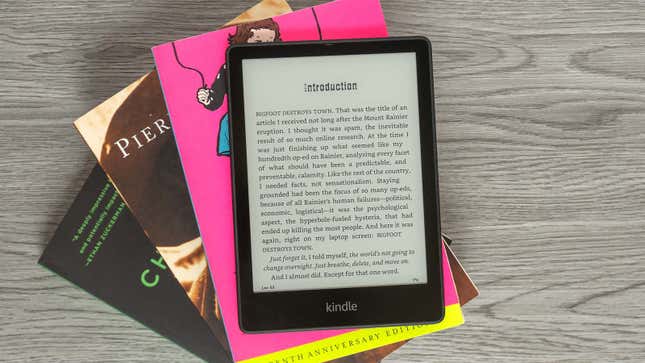
Arriving in late 2021, the Kindle Paperwhite 5 came with some major improvements over previous models, including a larger 6.8-inch, 300 PPI E Ink screen, USB-C and wireless charging, and screen lighting with color temperature adjustments allowing for warmer tones at night. The biggest reason to splurge on the $140 Paperwhite 5 is that it’s completely waterproof, so it’s safe to use at the beach, by the pool, in the tub, or during a hurricane, even if it gets completely submerged.
The Other Best E-Reader For Most Users: Kobo Clara 2E
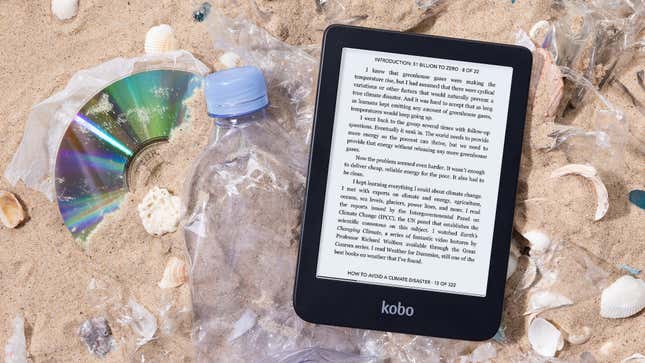
Looking for an alternative to the Amazon Kindle Paperwhite 5 (or Amazon in general)? The $130 Kobo Clara 2E offers a slightly smaller six-inch, 300 PPI E Ink screen, but 16GB of storage by default, which is ideal for storing both ebooks and audiobooks. It’s also completely waterproof, so users don’t have to be as diligent about taking care of it. And unlike the Paperwhite 5, Kobo boasts the Clara 2E’s case is made from 85% recycled plastic, with 10% of it sourced from plastic that was ocean-bound.
The Best Budget E-Reader: Amazon Kindle (2022 Model)
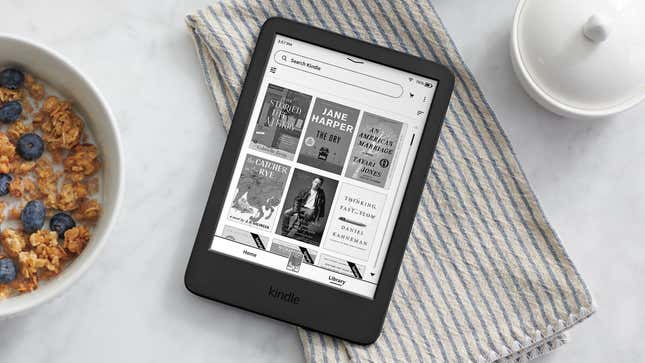
If you only care about reading books with lots and lots of text, the basic Amazon Kindle, recently updated last September, is an easy choice. The latest model offers USB-C charging, 16GB of onboard storage, an improved E Ink screen with more resolution so text looks sharper and easier on the eyes, and access to Amazon’s well-stocked ebook store. It’s $100 for the version featuring ads on the lockscreen, or $120 without.
The Other Best Budget E-Reader: Kobo Nia
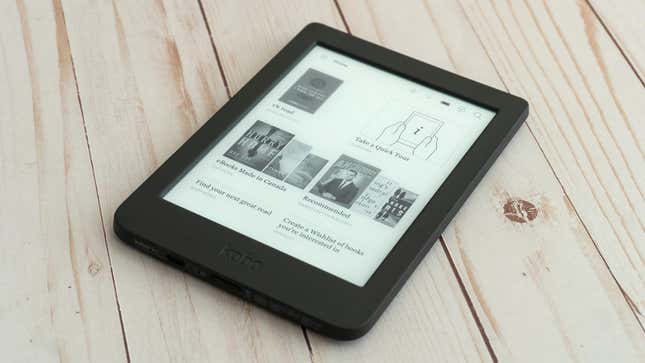
Although a few years old at this point, the Kobo Nia hits the $100 price point without any advertisements aside from the recommendations made in the Rakuten Kobo ebook store that’s just as well stocked as the competition’s. It’s a solid alternative for those who’d rather skip Amazon’s hardware and eco-system, offering wider support for various ebook formats, but with a few compromises including a screen with less resolution and just 8GB of storage—although that’s easily enough for storing a downloaded library of 6,000+ ebooks.
The Best E-Reader for Those Who Don’t Want to Decide: Onyx Boox Leaf 2
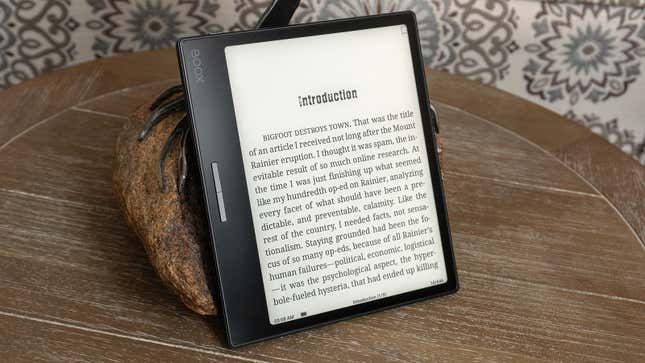
In the market for an e-reader but don’t want to lock yourself in on either Amazon or Kobo’s stores? Onyx might not be as recognizable a brand as Amazon or Kobo, but the $200 Boox Leaf 2 is the most powerful e-reader on the market. It’s got a seven-inch, 300 PPI E Ink screen with color adjustable screen lighting, 32GB of onboard storage that’s expandable through memory cards, built-in page turn buttons, and it runs Android 11 with full access to the Google Play app store. That means that you can load your ebook and PDF files directly onto the Boox Leaf 2, and download both the Amazon Kindle and Kobo apps and shop for titles through whichever ebook store happens to offer the best price at the time.
The Best E-Note: reMarkable 2
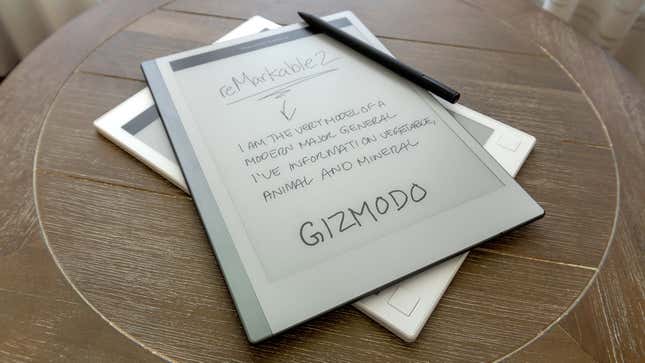
The reMarkable tablet was the first E Ink device designed to replace a notebook and pen with digital paper, and the $400 (plus the cost of a stylus) reMarkable 2 took everything great about the original and made it even better. Using Wacom’s tried-and-tested stylus technology means the pen never needs to be charged, and writing on the reMarkable 2's screen is as fast and responsive as writing with a real pen on real paper. It’s the standard to which all other e-note devices are compared, and still manages to impress with an incredibly thin design and a robust file syncing system that makes documents instantly available on PCs and smartphones.
Add the new Type Folio keyboard case accessory, which replaces the reMarkable’s on-screen keyboard with a physical one, and the tablet becomes a much better tool for taking detailed notes during an hours long meeting or presentation.
The Best E-Note For Kindle Users: Amazon Kindle Scribe

Amazon is relatively late to the e-note game, a term used to describe larger E Ink devices with support for a stylus for taking notes, but don’t count the company out. The recently announced Amazon Kindle Scribe, which starts at $340, boasts a 10.2-inch, 300 PPI E Ink screen and an asymmetrical design with a thicker bezel on one side making it easier to hold in one hand. It’s best feature might be a self-organized system of sticky notes that can be used to annotate ebooks and other documents, plus access to the expansive Amazon ebook store—one thing the reMarkable 2 does not.
The Best E-Note For Kobo Users: Kobo Elipsa 2E
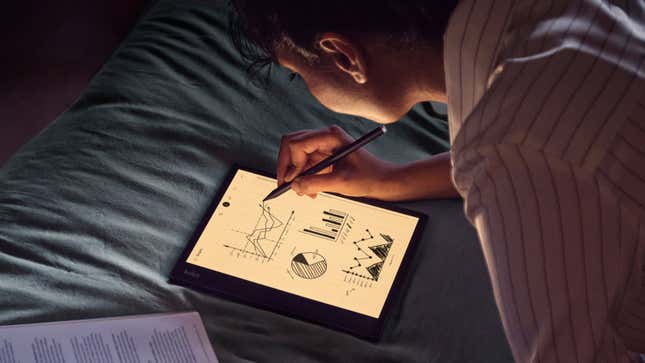
Although Kobo did manage to get an e-note device out the door before Amazon did, the original Kobo Elipsa left us wanting both a better pen on paper experience and a better reading experience. Two years later, the Kobo Elipsa 2E has arrived, bringing with it many welcome upgrades. Although it doesn’t offer as nice a screen as the Kindle Scribe—it’s E Ink display is still stuck at 227 PPI instead of the Scribe’s 300 PPI—it does offer an improved reading experience with the addition of a warm glow setting for reading at night. For the same $400 price tag as the original, it also introduces an upgraded magnetic stylus with a dedicated eraser on the end, a beefier processor improving the writing experience, and the option to sync notes and documents to Google Drive. And, like the original, it offers access to Kobo’s expansive ebook store right on the device.
The Best E-Note For Power Users: Bigme Inknote Color
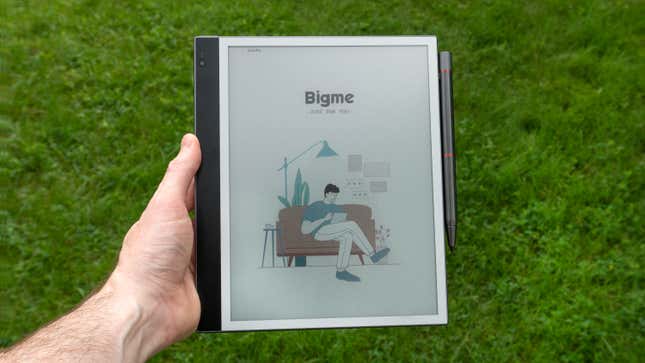
If you’ve been tempted by the color electronic paper screens that E Ink has been making over the past couple of years, the Bigme InkNote Color is both a great e-reader that won’t limit comic books to black and white, and an excellent e-note to boot. It allows users to take notes with an included stylus using a simulated pen on paper experience that’s hard to beat. It also runs Android 11, with full access to the Google Play app store, so you can download reading apps from companies like Amazon and Kobo, productivity apps including mobile versions of Microsoft Word and Excel, and plenty of games.
Want more of Gizmodo’s consumer electronics picks? Check out our guides to the best phones, best laptops, best cameras, best televisions, and best tablets and eReaders. And if you want to learn about the next big thing, see our guide to everything we know about the iPhone 15.